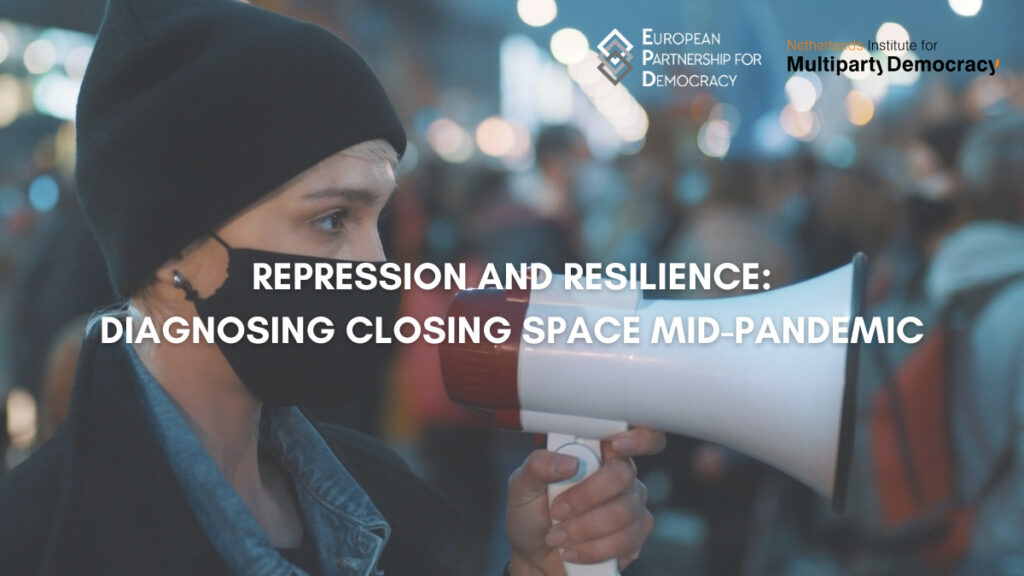Repression and resilience: Diagnosing closing space mid-pandemic

Join our workshop on closing democratic space on 25 June at 2-3.30pm (CEST). Register here.
The past decade has been challenging for democracies worldwide. In fact, many experts point to a trend of ‘democratic backsliding’ or ‘autocratization’, characterized by continued attacks on democratic space.
The COVID-19 pandemic has further complicated the picture. Overriding public health concerns often forced authorities to implement drastic measures. Yet, the crisis has also forced governments to tread a thin line between admissible health measures and the blatant abuse of emergency powers, to the detriment of democratic space.
Diagnosing Closing Space: A paper
Based on this context, NIMD has teamed up with the European Partnership for Democracy to launch a new paper called Repression and Resilience: Diagnosing Closing Space Mid-Pandemic.
The paper illustrates how democratic space was affected by the COVID-19 crisis, drawing on case studies from Burundi, Colombia, El Salvador, Guatemala, Honduras, Indonesia, Kenya, Uganda and Venezuela, as well as the wider research community.
Our research aims to identify structural trends across these countries. Based on this, it offers recommendations on what the pandemic means for practitioners, the EU and EU Member States’ policies and programming.
Key recommendations
- Adopt a clear framework for identifying and analyzing democratic space.
- Strengthen global and European cooperation and coordination on democratic space with like-minded partners, to ensure coherence and effectiveness of action.
- Adapt funding modalities and practices to ensure funding empowers change-makers.
- Support structural reform through local civil society to ensure an inclusive post-pandemic recovery that also defends and expands democratic space.
- Embed accountability and transparency in support to democratic institutions and watchdogs, so as to empower them in effectively countering attacks on democratic space and providing oversight.
- Support targeted action on inclusiveness in post-pandemic recovery to protect democratic space and make it representative of all voices in society.
- Support a democratic digital transition of infrastructure, institutions and oversight actors.
- Lead by example, build back better at home through innovative and participatory decision-making as well as decisive action against democratic backsliding within the EU.
For a full list of recommendations and ideas for action, see the full paper here.
Join our workshop on closing democratic space
To present these recommendations, NIMD and EPD are holding a workshop on 25 June at 2-3.30pm.
The workshop brings together CSOs and researchers on democratic space during the pandemic, in order to jointly identify the key trends and discuss the implications of research findings for EU and Member State external action.
Speakers:
- Thijs Berman, Executive Director of the Netherlands Institute for Multiparty Democracy, former Member of the European Parliament and journalist
- Chiara Adamo, Head of Unit, DG International Partnerships, European Commission
- Ruth-Marie Henckes, European Partnership for Democracy
- Aarti Narsee, Civic Space Research Officer, Civicus
- Rebecca Gordon, Research Fellow Birmingham University, Westminster Foundation for Democracy
Moderated by EPD Executive Director Ken Godfrey.
Your active participation is welcome! There will be plenty of space for discussion and exchange among participants and speakers.